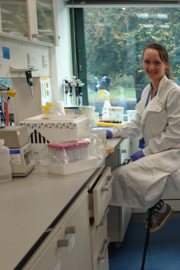Agricultural Research
Latest Research
Research Archive
- Research articles from 2025
- Research articles from 2024
- Research articles from 2023
- Research articles from 2022
- Research articles from 2021
- Research articles from 2020
- Research articles from 2019
- Research articles from 2018
- Research articles from 2017
- Research articles from 2016
- Research articles from 2015
- Research articles from 0
« Back to Agricultural Research
Regulation of polar growth in plant roots: the interplay of signaling and vesicle trafficking.
With a continuously growing global population there is an ever-increasing need to develop new ways to improve and safeguard crop yield. In order for plants to achieve high yields, correct root development is critical so that plants can optimise nutrient uptake. Plants also differ from animals in that, plants cannot move away from an unfavourable environment; instead plants respond to different stimuli and mechanical stress by generating differential growth across a tissue. Differential growth is when cells on one side of a root or stem expand while cells on the opposite side do not, creating curvature that effectively moves the tissue toward or away from stimuli. This differential growth across a root requires a complex coordination of signals to enable the cells to grow independently. This coordinated growth must be tightly regulated, and is done so by signalling peptides and their receptors, which upon activation can lead to a wide variety of downstream processes. One such receptor is known as FERONIA (FER) and is believed to be important in regulating this differential growth in roots.
Little is known about the regulation of differential growth. It is hypothesised that FER is involved in directing cargo, required for cell growth, that’s destined for the membrane of cells to specific locations at the cell surface. This project seeks to obtain a functional understanding of these mechanisms by identifying other proteins involved in this FER signalling. If these mechanisms can be understood then this opens up the possibility of being able to manipulate this process. This can lead to the plants being better adapted to cope with certain growth inhibiting stresses, and therefore reducing the risk of a low yield in crops.
Another benefit to this project is the development of a new technique that aims to overcome the limitations currently experienced when studying these receptors. When studying receptors that have known responses to stresses, such as mechanical in relation to FER, it makes it incredibly difficult to distinguish between responses caused by sample preparation and responses seen under native conditions. Currently the only available techniques cannot enable the locational aspect of this question to be addressed nor do they offer an accurate close to native view of the signalling events. If a technique can be developed whereby the sample preparation procedure can be reduced, the results obtained edge closer to what is really happening in the native system in roots. This project seeks to develop such a method. This has wide-scale benefits as once this technique is developed it has the potential to be used when studying other signaling pathways in a variety of species.



